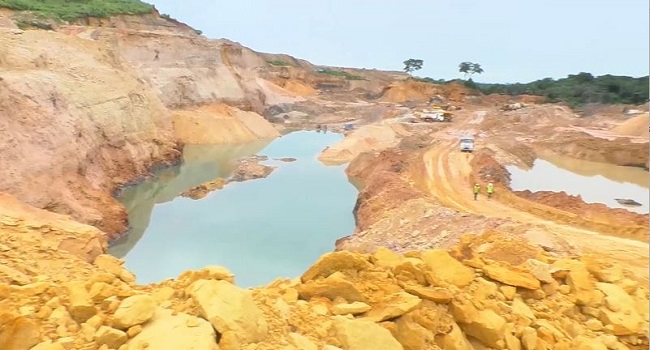President Bola Tinubu’s administration has attracted over $800 million in processing investments within Nigeria’s solid minerals sector, owing to its new policy of local value addition and stricter licensing regulations, the Federal Government has announced.
According to a statement by Presidential Spokesperson Bayo Onanuga, the sector also generated more than ₦38 billion in revenue in 2024—up from just ₦6 billion the previous year—despite receiving only 18% of its ₦29 billion allocated budget.
This revelation was made by the Minister of Solid Minerals Development, Dele Alake, during an interview for a forthcoming State House documentary marking President Tinubu’s second year in office.
Alake stated that investor interest has grown substantially due to the administration’s sweeping reforms in the mining sector. He cited key projects such as a $600 million lithium processing plant near the Kaduna-Niger border (set for commissioning this quarter), a $200 million lithium refinery near Abuja nearing completion, and two additional plants in Nasarawa expected before Q3 2025.
“These investments reflect our policy that no miner will be granted a licence without a clear plan for local processing. The era of exporting raw minerals is over,” Alake said.
“When we assumed office, the sector was generating just ₦6 billion a year. By the end of 2024, that figure had risen to ₦38 billion—even though we received only 18% of our budget. This shows the effectiveness of our reforms.”
In Q1 2025 alone, the Mining Cadastral Office and Mines Inspectorate generated ₦6.9 billion and ₦7 billion respectively. Alake predicted 2025 would be a record year, with ₦1 trillion earmarked for mineral exploration aimed at producing globally certified geological data.
“Exploration is essential. Nigeria had previously spent only $2 million on it, compared to $40 million in Sierra Leone, $148 million in Côte d’Ivoire, and over $300 million in South Africa. Serious investors won’t engage without reliable data,” he added.
The Minister said the focus is now on translating Nigeria’s mineral wealth into tangible economic benefits such as job creation, technological advancement, and industrial growth.
As part of the ministry’s seven-point agenda, over 300 illegal miners were arrested in 2024, with 150 prosecutions ongoing and nine convictions secured—including foreign nationals. Alake said both enforcement and community empowerment were being pursued.
“We’re combining kinetic and non-kinetic strategies. While the Mining Marshals crack down on illegal activity, we’re also formalising artisanal miners into cooperatives, making them eligible for financing and profit-sharing,” he said.
To date, over 250 mining cooperatives have been established to bring informal miners into the formal economy.
Alake also disclosed that Nigeria now chairs the African Mineral Strategy Group, a new continental alliance advocating for value addition and fairer trade deals across Africa.
“This leadership role followed Nigeria’s position at the 2024 Future Minerals Conference in Riyadh. Africa is now united in saying: no more export of raw minerals without local beneficiation.”
He added that investor confidence is rising, with high-level interest from officials in the UK, US, Saudi Arabia, and the UAE.
“The former British Deputy Prime Minister invited me to Downing Street to discuss their keen interest in Nigerian lithium,” Alake said. “The U.S. is also seeking alternatives to China and views Nigeria as a credible option.”
With improved regulation, growing foreign investment, and a clear route to industrialisation, Alake said Nigeria’s solid minerals sector has become a cornerstone of President Tinubu’s economic diversification strategy.
“We’ve never had it this good in the solid minerals sector. We’re rebuilding confidence, gathering reliable data, enforcing compliance, and returning real value to Nigerians.
“The Mining Cadastral Office alone received over 10,000 applications this quarter from local and international investors. This reflects the vibrancy we’ve introduced—unmatched before Tinubu’s administration,” he concluded.


